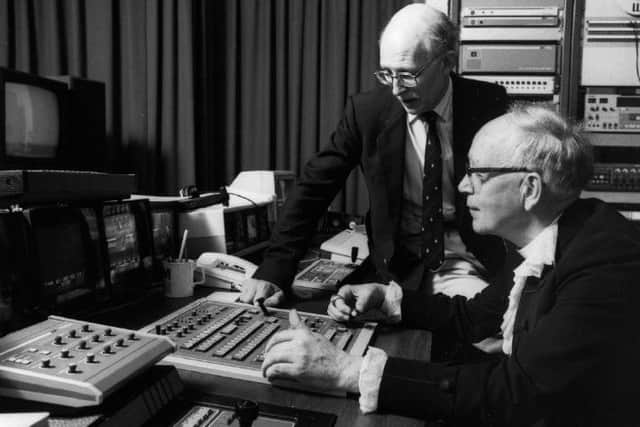Oibituaries: Rev Ralph CP Smith, Minister who helmed BBC’s Songs of Praise and ran Pathway Productions for the Church of Scotland
In the 1980s he headed up the Church of Scotland’s audio visual unit, making programmes for church and charity use. At his behest, the unit was renamed Pathway Productions to appeal to wider denominations. Productions were made for the BBC and STV and became increasingly sophisticated. The unit won two Scottish film awards.
His father was a Writer to the Signet in Edinburgh, himself from a legal family, who had been severely injured in the First World War. His mother came from a medical family who had been missionaries in China at the turn of the century, where his grandfather was responsible for producing the first English/ Chinese medical dictionary. His great grandmother, an American, was descended from the Mayflower expedition and, like other family members of that generation, was devoutly Christian. Young Ralph was influenced by his parents’ sense of social responsibility. The family had a succession of house guests organised through the church; in the 1930s there was a family of German J ewish refugees, and during the Second World War they took in active servicemen from the ranks, on leave and unable to get home. And at the end of the war, they received German POW officers who had given their parole. One of these was a padre, who like Ralph’s father, had lost his right arm in the first war. Thus a strong bond of reconciliation was formed between the families.
Advertisement
Hide AdAdvertisement
Hide AdAt the Edinburgh Academy he had been leader of the school orchestra, and as an undergraduate at St Andrews University he spent much time in the chapel choir, madrigal groups and the university orchestra. The music study and experience was to put him in good stead for his later broadcasting career. After national service, which he spent teaching in the Royal Army Educational Corp, he studied divinity at New College Edinburgh under the esteemed Professor Torrance. He was then awarded a Fulbright scholarship to study psychology of religion at the inter-denominational Union Theological College on Broadway, New York. There he graduated Master of Sacred Theology (STM).


On returning to Scotland in 1960 he commenced his first charge as an ordained minister at Gallatown Parish Church in Kirkcaldy. This was a busy period with his young family, where there was a hard- working and loyal congregation. After leaving for the BBC in 1966, he subsequently returned to the ministry and became associate minister at New Kilpatrick Parish church, Bearsden, for four years in the 1980s. The congregation was large with a membership of 2,400.
One of his ideas, while at the BBC, was for Tom Fleming to interview blinded ex-servicemen for the Re membrance Sunday service, who would explain why a particular hymn meant much to them. The idea caught on with the BBC in London, and soon interviews were being filmed to be slotted in the hymn introductions.
In the 1970s a BBC Songs of Praise production would require a crew of up to 30 people, several large lorries of clunky equipment and a control van, in effect a mini production studio. All this had to be wrested away from Saturday’s football coverage in good time for the kirk the next day. The proceedings required a carefully prepared shooting script, with cuts from one camera to another to be correctly made in time to the music. Editing was so time- consuming and expensive – the tapes required to be manually cut with a razor – that the recording was in effect a live performance; it had to be got right first time.
Careful relationships had to be maintained with local churches. This was not always easy. On one occasion, while filming in the Western Isles, it was hoped that a Free Church congregation might be prepared to join a televised Church of Scotland service. The problem was that the engineer’s pressing of the transmit button would, in the eyes of the minister of the former, constitute the sin of paid work on the Sabbath. Thus, after a theological debate, a temporary cessation to the Disruption was not to occur.
Towards the end of his broadcasting career with Pathway Productions, he became the senior Chaplain to his minister in Mayfield Church, the Very Rev Dr Bill Macdonald, when Moderator to the General Assembly. In semi-retirement Ralph became a chaplain at the Western General Hospital in Edinburgh. There he administered pastoral care to patients, many of whom were being treated by the oncology department, who appreciated his sunny personality and generosity of spirit.
On full retirement he had more time to research and reflect upon his Christian beliefs. He wrote a number of papers of a liberal persuasion, perhaps anticipating a modern-day Reformation. In his view current Christianity does not need to depend upon a literal interpretation of the Ascension or Resurrection. What is essential is that the certainties of the disciples with whom Jesus lived within and beside, engendered such energy that they founded a universal church which survived and grew.
He is survived by Florence, his wife of 65 years; their children Ralph and Graham, and his grandchildren and great grandchildren.
Obituaries
If you would like to submit an obituary (800-1000 words preferred, with jpeg image), contact [email protected]